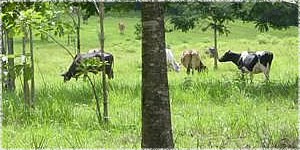Objectives

The main objective of the name is to assess the environmental benefits of a set of silvo-pastoral practices and empower traditional livestock farmers in Tugi village through (the participatory research and training approach ) technical assistance based on a how-to-guidance (HTG) philosophy. The specific objectives of the name are to:
- Build the indigenous capacity of livestock farmers in the community to identify, understand and examine the dynamics of the environment and livestock production under the current traditional farming system.
- Develop farmers skills and competences for them to be able to measure the environmental costs of traditional herding and the potential and real benefits of an improved livestock production system based on science and technology.
- Understand farmers perceptions and expectations of environmental effects and consequences of climate change on their livelihoods.
- Train farmers on the application of a set of silvo-pastoral andagroforestry technologies and encourage them to adopt those within the mixed farming systems they practice
- Encourage integrated management of grazing lands in Tugi village to ensure year-round production of high quality forage and guaranteeproductive, quality animals and by-products.
- Contribute to find sustained solutions to the chronic problem offarmer-grazer conflicts in the area and environmental degradation due to over-grazing.
- Scale up the name to other communities in the region and within the country.